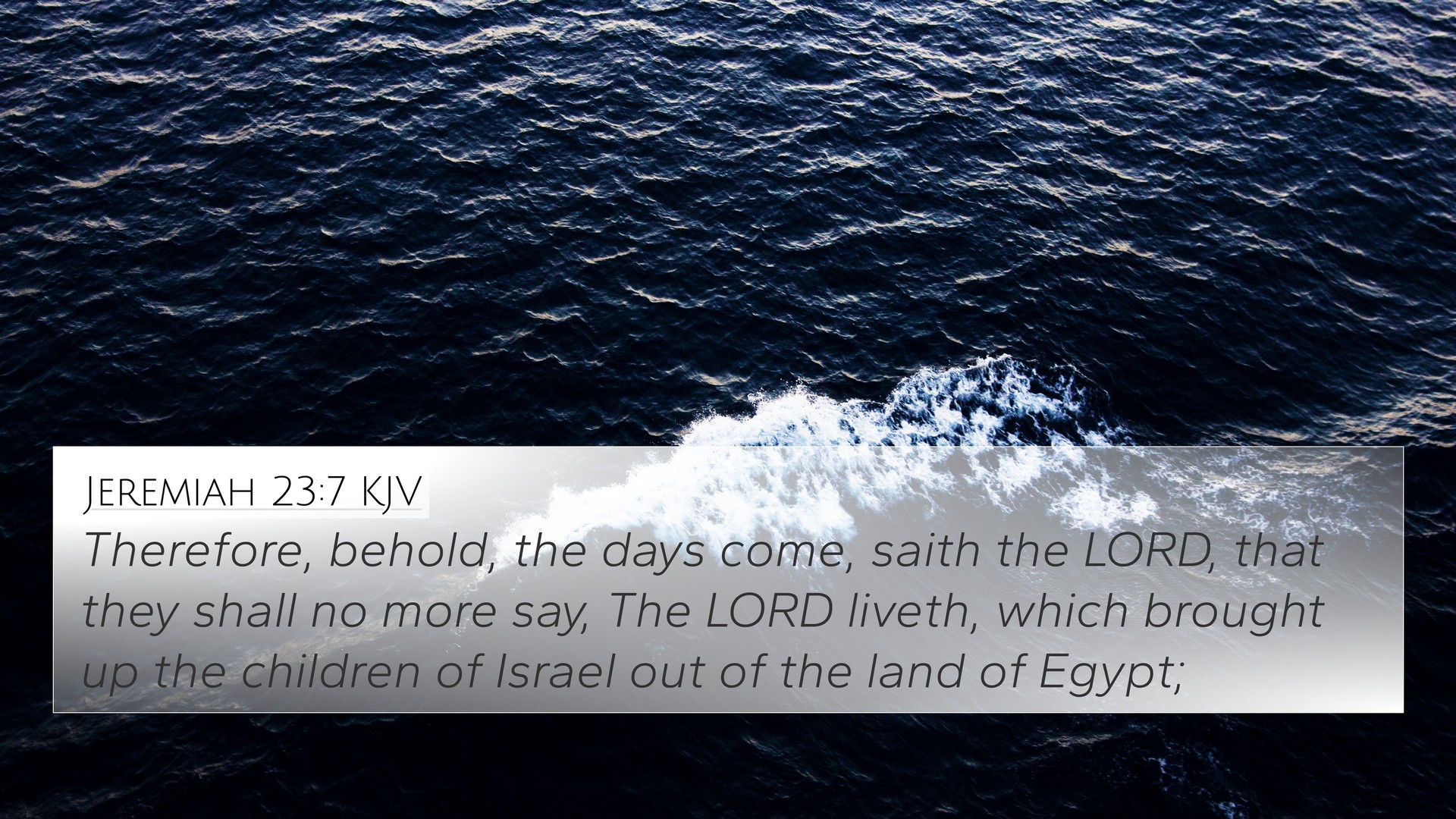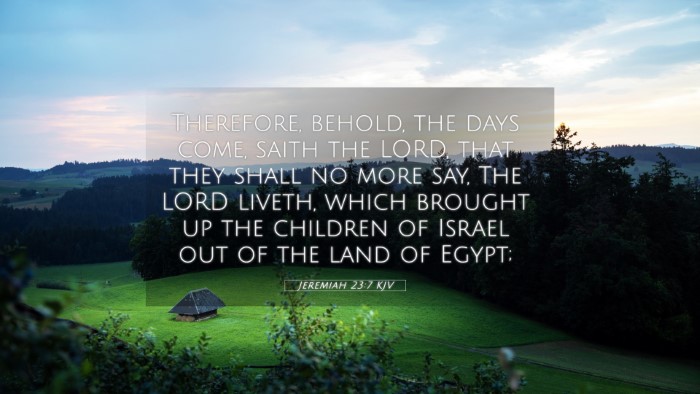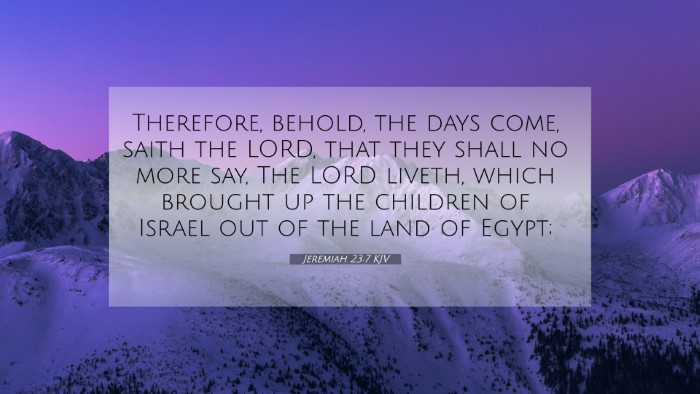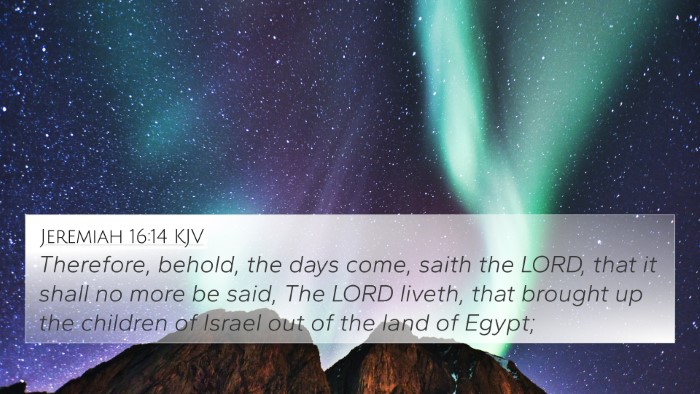Understanding Jeremiah 23:7
Verse: "Therefore, behold, the days come, saith the LORD, that they shall no more say, The LORD liveth, which brought up the children of Israel out of the land of Egypt;" (Jeremiah 23:7, KJV)
Summary of Meaning
This verse from Jeremiah speaks to a future time when the Israelites will turn their eyes away from their past deliverance from Egypt and instead focus on their coming restoration and salvation. It reflects a shift in the narrative of God’s acts among His people and emphasizes a new identity and hope in what God is going to achieve for them.
Insights from Commentaries
-
Matthew Henry:
Henry emphasizes that the shift from recalling the Exodus to an anticipated future signifies a deeper understanding of God's work. The Israelites are reminded that God's act of delivering them from Egypt will become a lesser narrative compared to the upcoming salvation. This foreshadows a more profound and significant deliverance through the coming Messiah.
-
Albert Barnes:
Barnes notes that the emphasis is on the New Covenant and looks forward to a collective acknowledgment of the Lord who will gather and unite His people. The new identity in Him will surpass the historical events of the Exodus, demonstrating the depth of God’s future promises.
-
Adam Clarke:
Clarke provides insight into the broader implications for the Church, interpreting this as a transition from a physical to a spiritual understanding of salvation. He highlights the theme of God’s unceasing faithfulness and the upcoming reality of spiritual liberation through Christ.
Inter-Biblical Connections
This verse connects thematically with several other Bible verses, showing the continuity of God's redemptive plan:
- Isaiah 43:16-19: Echoes the theme of God making a way in the wilderness, pointing to new miracles ahead.
- Hebrews 8:6-13: Discusses the better covenant established by Christ, surpassing the old.
- Ezekiel 34:11-16: Portrays God as the Shepherd who gathers His lost sheep, providing a connection to the ingathering of Israel.
- Romans 11:26-27: The future restoration of Israel, underlining God's unbreakable covenant with His people.
- John 10:16: Jesus emphasizes His mission to gather all His people, fulfilling the prophetic hopes contained in Jeremiah.
- Galatians 4:4-5: Describes the coming of Christ to redeem those under the law, highlighting the change in understanding salvation.
- Matthew 5:17: Jesus says He has come to fulfill the law and the prophets, drawing a line back to promises made to Israel.
Thematic Bible Verse Connections
Additionally, the themes of remembrance and future hope resonate through various scriptures:
- Exodus 13:3 - A call to remember the day of deliverance from Egypt.
- Psalms 77:14 - Speaking of God's wonders and provision in history.
- Revelation 21:4 - Envisioning a future without pain, focused on hope for what is to come.
Tools for Bible Cross-Referencing
To dive deeper into Bible study and understand themes like those found in Jeremiah 23:7, the following tools can be utilized:
- Bible concordance - A valuable resource for locating specific themes and topics across scriptures.
- Bible cross-reference guide - Helps in identifying related verses for comparative analysis.
- Cross-reference system - Utilizing a structured approach to trace themes and connections.
Conclusion
Jeremiah 23:7 serves as a profound reminder of how God’s plans transcend historical events, moving believers from the past to expectations of future fulfillment. This verse, alongside its cross-references, encourages believers to look beyond their historical deliverance towards the ultimate promise of redemption and restoration in Christ.
Recommended Study Approaches:
- How to use Bible cross-references: Investigate links between verses comprehensively for deeper understanding.
- Identifying connections: Explore the relationship between Old and New Testament, emphasizing the continuity of God's promise.
- Comparative studies: Analyze themes between prophets and apostolic teachings to enrich understanding.






